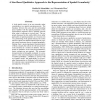Free Online Productivity Tools
i2Speak
i2Symbol
i2OCR
iTex2Img
iWeb2Print
iWeb2Shot
i2Type
iPdf2Split
iPdf2Merge
i2Bopomofo
i2Arabic
i2Style
i2Image
i2PDF
iLatex2Rtf
Sci2ools
116
click to vote
IJCAI
2007
2007
A Size-Based Qualitative Approach to the Representation of Spatial Granularity
A local spatial context is an area currently under consideration in a spatial reasoning process. The boundary between this area and the surrounding space together with the spatial granularity of the representation separates what is spatially relevant from what is irrelevant at a given time. The approach discussed in this article differs from other approaches to spatial granularity as it focusses not on a partitioning of the spatial domain, but on the notions of grain-size and the limited extent of a spatial context as primary factors of spatial granularity. Starting from a mereotopological characterization of these concepts, the notions of relevant and irrelevant extension in a context are defined. The approach is qualitative in the sense that quantitative, metric concepts are not required. The axiomatic characterization is thoroughly evaluated: it is compared to other mereotopological characterizations of spatial granularity; soundness is proven with an example model; and applicabil...
Related Content
| Added | 29 Oct 2010 |
| Updated | 29 Oct 2010 |
| Type | Conference |
| Year | 2007 |
| Where | IJCAI |
| Authors | Hedda Rahel Schmidtke, Woontack Woo |
Comments (0)

